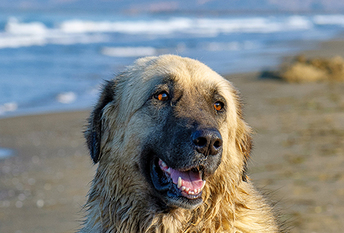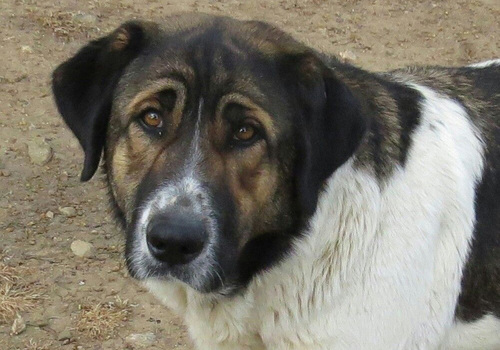This breed requires little grooming. The coat needs thorough brushing-out during the twice yearly shedding seasons. You can get away with little attention to the rest of the year. The Rafeiro do Alentejo is a seasonal, heavy shedder.The strong, fast-growing nails should be trimmed regularly with a nail clipper or grinder to avoid overgrowth, splitting, and cracking. The ears should be checked regularly to avoid a buildup of wax and debris, which can result in infection. Teeth should be brushed regularly.
Options for exercise could include playtime in the backyard, preferably fenced, or being taken for walks several times a day. Exercise can also come in the form of indoor activities, like hide-and-seek, chasing a ball rolled along the floor, or learning new tricks. Certain outdoor activities such as hiking or retrieving balls can provide a good outlet for expending energy. If you live in an apartment, even short walks in the hallways can give your dog some exercise, especially during inclement weather. Training for dog sports like agility, obedience, and rally can also be a great way to give your dog exercise.
When fully mature, this breed has an average to low need for exercise. If not actively working, it needs to be taken on a daily walk or jog.
If you get a Toller puppy from a breeder, they would give you a feeding schedule and it's important to stick to the same routine, feeding the same puppy food to avoid any tummy upsets. You can change a puppy's diet, but this needs to be done very gradually always making sure they don't develop any digestive upsets and if they do, it's best to put them back on their original diet and to discuss things with the vet before attempting to change it again.
Older dogs are not known to be fussy or finicky eaters, but this does not mean you can feed them a lower quality diet. It's best to feed a mature dog twice a day, once in the morning and then again in the evening, making sure it's good quality food that meets all their nutritional requirements.
Some dogs are prone to gettingoverweight, so watch your dog’s calorie consumption and weight level.Treatscan be an important aid in training, but giving too many can cause obesity. Learn about whichhuman foodsare safe for dogs, and which are not. Check with your vet if you have any concerns about your dog’s weight or diet.Clean, fresh water should be available at all times.
Little data exists for health problems in this breed. However, when bred to be very oversize, they may be subject to hip dysplasia, and dogs with deep chests sometimes suffer from bloat. Working with aresponsible breeder, prospective owners can gain the education they need to learn about specific health concerns within the breed.
The Rafeiro do Alentejo isn't deal for a first-time dog owner. Patience and perseverance are required to adequately train it.











